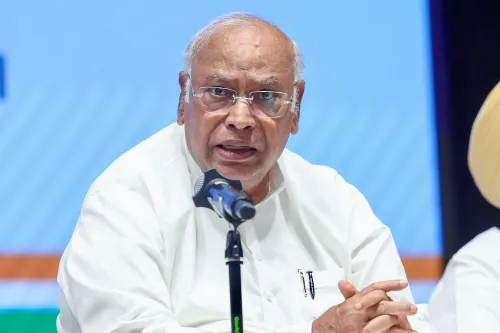Did Security Forces Successfully Thwart a Rhino Poaching Attempt in Assam’s Kaziranga?

Synopsis
Key Takeaways
- Effective collaboration among local police and forest authorities is crucial in combating poaching.
- The arrest of poachers highlights the ongoing threat to wildlife.
- Advanced intelligence and surveillance are essential in anti-poaching operations.
- Public awareness and involvement play a significant role in wildlife conservation.
- Kaziranga remains a critical site for biodiversity and conservation efforts.
Guwahati, Oct 16 (NationPress) On Thursday, vigilant security forces at Assam’s Kaziranga National Park & Tiger Reserve (KNPTR) successfully thwarted an attempt to poach rhinos, leading to the arrest of three individuals, as reported by officials.
KNPTR Director Sonali Ghosh stated that a collaborative operation, involving the Biswanath Police alongside Majuli and Lakhimpur Police, was conducted under the leadership of Additional Superintendent of Police (ASP) (Crime), Biswanath, and ASP (HQ).
The authorities apprehended three suspected armed poachers identified as Muhikanta Pegu (24), Manuj Pathari (38), and Kiran Pegu (41).
According to Ghosh, acting on information provided by the detained suspects, law enforcement recovered a .303 rifle and nine 70 mm 12-bore cartridges from the residence of Debajit Pegu in New Dandi village, Biswanath district. Debajit Pegu is currently wanted.
An investigation is underway, supervised by ASP (Crime), Biswanath.
In an unrelated incident on October 15, a suspected poacher was fatally shot during a skirmish with forest guards within KNPTR, recognized as India’s seventh UNESCO World Heritage Site.
Officials from the National Park noted that, following intelligence reports regarding armed poachers' movements in the area, all anti-poaching units were activated to conduct searches and secure potential escape routes.
A river patrol team from Burapahar Range observed a suspicious light in Maite Tapu and detected the presence of armed poachers.
Upon being ordered to halt, the poachers reacted violently, firing upon the forest guards, who responded with controlled fire in self-defense.
Additional forest personnel were dispatched to the scene, and during an exhaustive search, the body of the deceased poacher was found. Ongoing efforts are being made to locate the accomplices who fled.
The identity of the slain poacher remains unknown. KNPTR officials confirmed that a .303 rifle and a handbag were recovered from the location.









